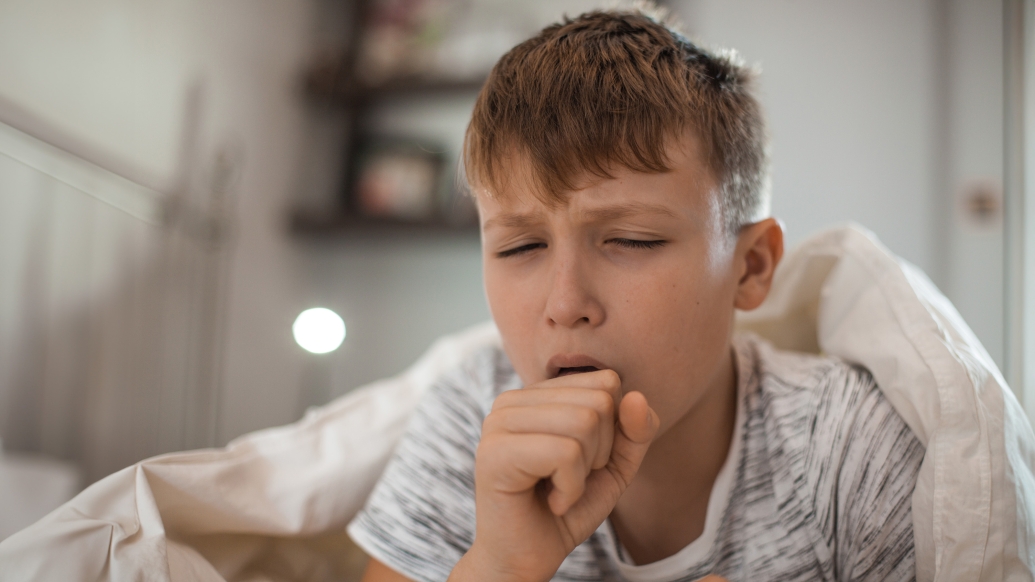The contagious respiratory tract infection is especially dangerous for infants
1:22 PM
Author |

Cases of a bacterial lung infection known as whooping cough, or pertussis, have been on the rise, with more than double the number of cases compared to last year.
The spike indicates a return to pre-pandemic levels of whooping cough, experts say, but the number of cases is still higher than what was reported at the same time in 2019, prior to the COVID-19 outbreak.
Debra Langlois, M.D., pediatrician at University of Michigan Health C.S. Mott Children’s Hospital, explains what people should know about the illness.
What is whooping cough?
Langlois: Whooping cough is a highly contagious respiratory tract infection. It’s caused by the bacteria Bordetella pertussis.
Initial symptoms are often similar to a typical cold virus, including runny nose and cough, but it can progress from there and become serious.
It gets its name from a high pitched “whoop” sound the infected person makes when they take a deep breath in following rapid, violent coughing episodes.
It’s important to note that newborns and infants with whooping cough will not 'whoop' and they may not cough. Newborns and infants with whooping cough will have difficulty breathing, and they may have apnea – pauses in breathing that are life threatening.” -Debra Langlois, M.D.
This happens during what’s known as the paroxysmal stage of pertussis, and this can last from weeks to months.
It’s important to note that newborns and infants with whooping cough will not “whoop” and they may not cough: Newborns and infants with whooping cough will have difficulty breathing, and they may have apnea – pauses in breathing that are life threatening.
Who's at risk for getting whooping cough?
Langlois: It’s a common misconception that only children can get whooping cough — it can affect patients of all ages, from newborns to adults. Infants and people with underlying medical conditions are at greatest risk of severe infection.
Deaths associated with whooping cough are rare, but infants are vulnerable to serious and life threatening complications because their immune systems are still developing, and they may be too young to be vaccinated.
What can you do to prevent getting whooping cough?
Langlois: Vaccination is the most effective protection against whooping cough.
We recommend whooping cough vaccination during pregnancy, which offers newborns protection before they are old enough to be vaccinated.
Close contacts of newborns should also be up to date on whooping cough vaccination and infants should receive vaccination starting at two months old.
Immunity to whooping cough following vaccination wanes over time. Please check with your healthcare provider that your whooping cough vaccination is up to date.
We also recommend good infection control measures, such as staying home when ill.
Why is there an increase in whooping cough cases this year?
Langlois: The jump in rates of whooping cough cases suggests we’re back to pre-pandemic levels.
There are a few theories behind this increase: One thought is that the safety measures that were in place during the pandemic, such as masking and social distancing, not only helped decrease spread of the COVID virus, but also other respiratory viruses as well as whooping cough.
We also have better testing for whooping cough, and an increased awareness of whooping cough outbreaks in our communities.
How do you treat whooping cough?
Langlois: If a patient is diagnosed with whooping cough, they are treated with antibiotics. Antibiotics may help reduce the severity and duration of the illness and risk of spreading it to others. We also recommend supportive care, including adequate rest and hydration.
Sometimes patients, especially infants, need to be hospitalized for whooping cough, because they need additional breathing support and support to stay hydrated.
If babies and children are experiencing respiratory distress or breathing difficulties, parents should seek immediate medical attention.
Sign up for Health Lab newsletters today. Get medical tips from top experts and learn about new scientific discoveries every week.
Sign up for the Health Lab Podcast. Add us wherever you listen to your favorite shows.

Explore a variety of health care news & stories by visiting the Health Lab home page for more articles.

Department of Communication at Michigan Medicine
Want top health & research news weekly? Sign up for Health Lab’s newsletters today!





